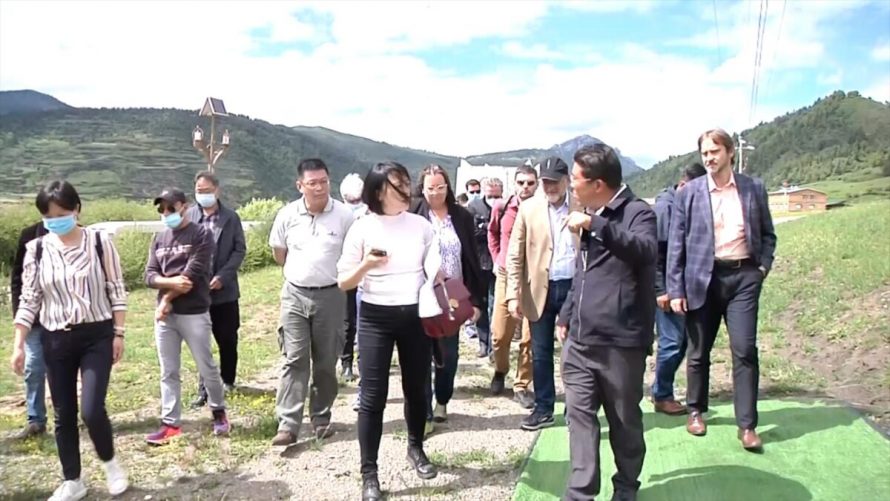ICT: Meaningful only if rights violations are raised
The International Campaign for Tibet has seen reports in the Chinese media about diplomats from 10 European and other countries being taken on a trip to two Tibetan areas in Sichuan Province. While ICT welcomes the interest of the countries in understanding the conditions of the Tibetan people, it is obvious that visiting two places in the domestic tourist circuit provides little insight on the welfare of the Tibetan people.
The two Tibetan areas visited lie outside the Tibet Autonomous Region, which is subject to a stricter regime of travel restrictions than any other region of China. In order to visit the TAR, all foreigners, including diplomats and journalists residing in China, need to acquire a special permit, which is almost without exception denied. When it is not denied, travel in the TAR is tightly controlled and allowed only through state-approved travel agencies. In 2018, the US Congress passed the Reciprocal Access to Tibet Act, which requires the State Department to issue visa sanctions against Chinese officials responsible for blocking access to Tibet for American citizens.
The Chinese state media outlet Ngaba (Chinese: Aba) Daily reported on June 22 that a group of 21 diplomats based in the Chinese city of Chengdu visited Zitsa Degu (Chinese: Jiuzhaigou) and Zungchu (Chinese: Songpan) counties in Ngaba Tibetan & Qiang Autonomous Prefecture in Sichuan on June 17 and 18. The diplomats were from Australia, Austria, France, Germany, Israel, Pakistan, Poland, Singapore, Switzerland and the United States, and the host was the Foreign Affairs Committee of the Sichuan Provincial Communist Party Committee.
The Ngaba Daily said the visit was “to show the positive image of the opening of Tibetan areas in Sichuan Province to the outside, and publicize the achievements of the reconstruction” after an earthquake that happened in the region in 2017. The visit was further to “investigate the local tourism recovery and targeted poverty alleviation after the epidemic.”

The diplomats were briefed by Wu Liyan, the deputy secretary of the State Party Committee, according to the report.
The report said among places the group was taken to were the Huanglong Scenic Area and Jiuzhaigou Scenic Area, Jiuzhaigou International Tourism Emergency Medical Rescue Center and the Xiangzang Art School in Tsotsang Gon (Chinese: Chuanzhusi )Township, where they watched Thangka painting and incense making. Thangkas are a form of traditional Tibetan artwork.
Tourism and related facilities are the least of the problems that the Tibetan people face under Chinese rule. As then-EU Foreign Affairs Chief Federica Mogherini told the plenary of the European Parliament in April 2018, “freedom of religion or belief is often violated in Tibet, and restrictions to access to the region are also in place.” The International Campaign for Tibet believes that by visiting tourist areas and facilities, the diplomats were not allowed to understand the state of religious freedom, freedom of movement and other key fundamental rights for the Tibetan people.
While it systematically denies access to Tibet to foreign governments, except on highly stage-managed, restricted tours, and makes independent visits for journalists all but impossible, China still claims that it is “steadily increasing the opening up” of Tibet to the outside world.
It is clear that handpicked government delegation visits are managed by Chinese authorities as an integral part of a global strategy to hide the realities of what is happening in Tibet today and to try to dominate and control the conversation around Tibet and, by doing so, further China’s political agenda and power. Through such officially arranged trips, where the diplomats do not have unhindered and independent interaction with ordinary Tibetans, the Chinese authorities are seeking to obscure their covert and coercive policies, while at the same time restricting meaningful engagement with the situation on the ground for journalists and governments. ICT calls on members of such delegations from other countries to be mindful of their visits possibly being used for propagandistic means, and to be ready to counter any such state media portrayals, also in public. In the case of visits to such Tibetan areas as Ngaba where systematic repression and Tibetan protest occur, ICT urges government delegates to raise issues of religious freedom, persecution of dissenters and human rights defenders, and reports of torture and ill-treatment.
The visit of the diplomats has taken place two weeks after the publication of ICT’s major report on denial of access to Tibet for European citizens. Our report, published on June 15, 2020, stated that there “is now an increasing awareness at European Union level of the importance of reciprocity, not only with regard to trade and economic relations, but also more generally relating to access to Tibet. Accordingly, there are moves to develop legislation in Europe, similar to the one in the United States.” The legislation referred to is the Reciprocal Access to Tibet Act.
On the same day of the publication of the report, 57 parliamentarians from 19 European countries published an op-ed in Euroactiv and other European publications calling on EU governments to “pass their own versions of the Reciprocal Access to Tibet Act and send Beijing a message that its unfair treatment of Europeans—as well as its isolation of the Tibetan people—is no longer acceptable.”
European Commission Vice President Josep Borrell said on March 9, 2020, “The Commission will continue to call on the Chinese authorities to allow reciprocal access to Tibet as part of the discussions in the Human Rights dialogue.”
ICT awaits reports from the diplomats about their trip. However, the Chinese authorities continue to politicize the issue of access to Tibet, with access granted only on China’s specific terms, and with different conditions to the rest of the People’s Republic of China. Denying access, or threatening to do so, is used as a means of shutting down critique by government officials, scholars, journalists and independent experts.